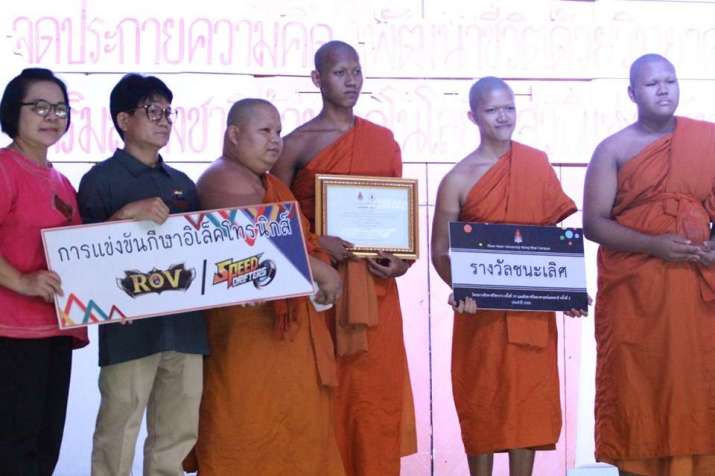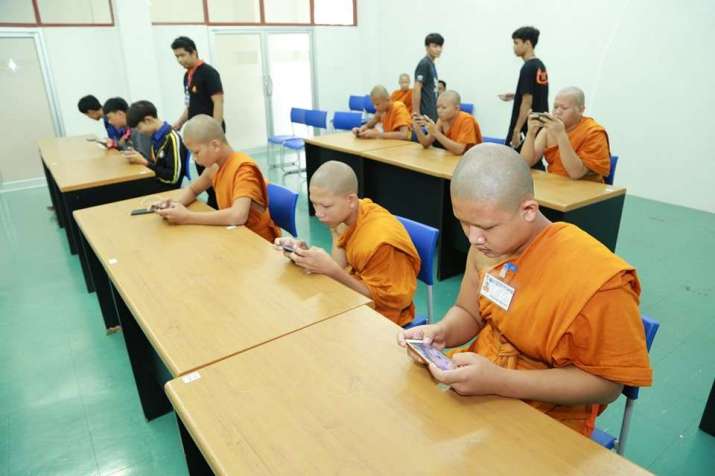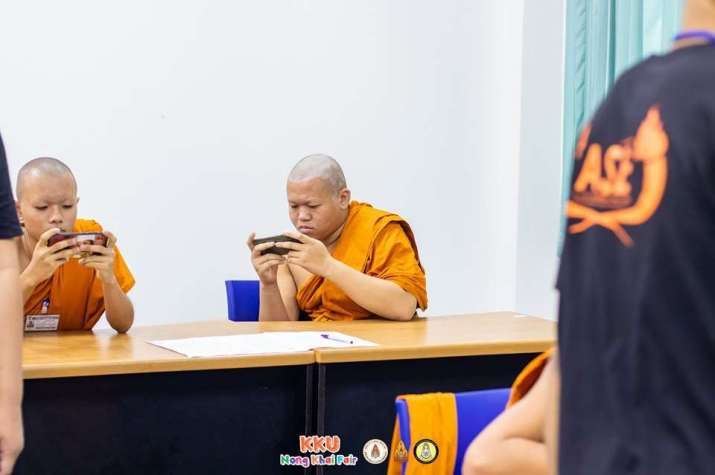NEWS
Novice Buddhist Monks Win Electronic Sports Tournament in Thailand
 Thai novice monks holding awards. From kotaku.com
Thai novice monks holding awards. From kotaku.comA team of novice Buddhist monks emerged victorious at a video gaming competition at the 2019 Khon Kaen University Nong Khai Fair. The fair is an annual competition, held this year from 15–18 August, in northeastern Thailand, and features academic and gaming, or e-sports competitions. The team of novice monks are high school seniors from Balee Sathit Suksa, a high school for monastics in Nong Khai Province.
“The novices wanted to try entering the competition, so we gave them that opportunity. However, we didn’t expect them to actually win,” chuckled Kokkiad Chaisamchareonlap, a monk and academic coordinator at the school. (Coconuts Bangkok)
According to Chaisamchareonlap, while the school is dedicated to novice monk students, they only study religion for 20 hours each week. The rest of their school time is spent on courses from a traditional academic curriculum. The students were introduced to the video game Speed Drifter through a computer class and desired to test their skills in the competition.
However, their victory did not come without controversy. As the Coconuts Bangkok news website reported, Twitter user @ParnkungTH wrote after the competition: “Usually I don’t make a big deal out of religious things, but I think this is inappropriate. It’s not illegal nor is it extreme, but I just feel like the monks should not have worn the robes to compete in the tournament.”
 Thai novice monks during the video game competition. From kotaku.com
Thai novice monks during the video game competition. From kotaku.comTheir academic advisor, Chaisamchareonlap, disagreed however, saying, “The novices are just children, like other people their age that need to grow, develop their skills, and explore their interests.” He continued: “We wanted to give the students an opportunity. A lot of them don’t have that, coming from poor families or broken homes.” (Coconuts Bangkok)
According to the South China Morning Post, electronic sports are growing in popularity in Thailand, boosted by the nation’s inclusion in this year’s Southeast Asian Games in the Philippines. In 2018, the tech company Infofed opened the Thailand eSports Arena, a venue capable of hosting as many as 50,000 spectators for large gaming tournaments. Thailand has an estimated 20 million gamers, ranking it among the top 20 in the world.
 Thai novice monks mid-game. From kotaku.com
Thai novice monks mid-game. From kotaku.comIn the Brahmajala Sutta (DN 1), the Buddha specified various types of games in which a noble disciple would not engage. These included chess-like board games, a game in which one attempts to remove sticks in a pile without tumbling the pile, practicing summersaults, a game of guessing others’ thoughts, and ball games.
These rules, like others, are known by monastics in most Buddhist traditions, but how they are interpreted can vary widely within a tradition, and even from one monastery to another. And as they were established 2,500 years ago and have not changed since then, they give little guidance for such modern forms of gaming such as e-sports.
In an investigation for Vice magazine last year, Robert Rath interviewed several Thais after encountering a poster in Vietnam that vividly warned Buddhists of the perils of excessive video game playing. The poster cautioned: “Waste Time in Playing Games, Barely Reborn into Human Life.”
 A poster from Vietnam, also in Southeast Asia, warning Buddhists against certain vices and their karmic consequences. From vice.com
A poster from Vietnam, also in Southeast Asia, warning Buddhists against certain vices and their karmic consequences. From vice.comVeerayuth Pongsiri, a former monk who remained a pious layman, told Rath that, “Video games distract junior monks, [they] cause problems. Sometimes they’re 10 years old and their maturity is not enough.” His greatest concern seemed to be practical in nature: “If the junior monk pays attention to a game for two hours a day or five hours a day, that’s less time for learning Buddhist teaching. He cannot manage the time.” (Vice)
At the same time, some studies have suggested that while video games may not be helpful for meditation, meditation practice might aid in video game playing. In an article in the 2006 Quarterly Journal of Experimental Psychology, researchers Paul A. M. van den Hurk, et. al., describe an experiment which has been replicated numerous times since in which they paired 20 experienced meditators against 20 age- and gender-matched peers to test their attention processing and efficiency. They found that those who had meditated not only had faster response times than their counterparts, but also showed a reduction in response errors.
References
Paul A M van den Hurk, et. al. 2006. “Greater efficiency in attentional processing related to mindfulness meditation” Quarterly Journal of Experimental Psychology. 63(6):1168–80
See more
3 young Thai monks crowned esports champions (Photos) (Coconuts Bangkok)
Thai Buddhist monks triumph in e-sports event as some fans criticise winners for wearing orange robes (South China Morning Post)
In Thailand, Buddhist Monks Grapple with the Meaning of Video Games (Vice)
Related news from Buddhistdoor Global
Thai Cave Boys Complete Nine Day Ordination as Novice Monks
Thailand’s Buddhist Monks Urged to Watch their Waistlines amid Obesity Epidemic
Buddhist New Year: Celebrating by Temporary Ordination in Myanmar
Eight Boys Ordained as Monks in Seoul Ahead of Celebrations to Mark Buddha’s Birthday
Buddhism-inspired Primary School in Thailand is Made Entirely from Earth and Bamboo
Related features from Buddhistdoor Global
Buddhistdoor View: Reflections on the Controversies in the Thai Buddhist Monastic Order
Buddhistdoor View: Monasticism for the Young—A Considered Choice?
Buddhistdoor View: The Unstoppable High of Video Games
Guidelines for Authentic Mindful Technology
Gompa: An Interview with Graham Coleman on an Online Vajrayana Monastery Service
On Technology and Human Connection: An Interview with Ajahn Brahm














